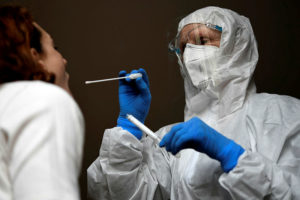
In ourblogfor Clinical Trials Day 2020 we summarized the COVID-19 studies that had been registered so far at theISRCTN registry. One year later and there are now over170COVID-19 studies registered. In thefirst partof this blog we looked back at the results of theplatformtrials and a selection of therepurposed drug treatmenttrials that have launched since then. In the second part we look back at the results of thevaccinetrials and studies looking at testing and the impact of COVID-19 on other conditions.
Vaccines
Multiple vaccines have been developed for COVID-19 around the world. The vaccine developed by theUniversity of Oxford and AstraZeneca was tested inPhase I/II,Phase II/IIIandPhase IIIstudies and theresultsconfirmed that the vaccine was effective.
The AstraZeneca vaccine has been approved for use in many countries including the UK. Mass vaccination against COVID-19 started in the UK in early December 2020 and is likely to continue until mid-2021. The AstraZeneca vaccine is now being tested in aPhase IIstudy in children.

其他候选疫苗正在测试中COVAC1,CROWN CORONATIONandENSEMBLE 2trials. There are also vaccines in development fromValnevaand theUniversity of Queensland. The safety of all of the vaccines is being monitored by theVAC4COVIDstudy initially launching in the UK and by theZVACstudy in Switzerland.
TheCOV-COMPAREstudy is comparing the immunogenicity of two doses of the AstraZeneca and Valneva vaccines, while theCom-COVandCom-COV2studies are comparing different combinations of vaccines (e.g. the AstraZeneca and the Pfizer-BioNTech vaccines) for the prime and boost doses, as well as comparing 4-week and 12-week intervals between doses.
The duration of protection of the current vaccines is unknown and further booster doses may be needed in 9 to 12 months’ time, which may coincide with seasonal influenza vaccination. Delivering COVID-19 and influenza vaccines at separate appointments will cause significant logistical challenges, so theComFluCOVtrial is determining the safety and immune response when both vaccines are given in different arms at the same appointment.

Testing
Testing has proven to be key for containing the spread of the virus. Theresultsof theCoV-19POCstudy showed that a new point-of-care test for COVID-19 provides results more quickly and could lead to improved infection control measures and patient flow compared with centralised laboratory PCR testing.
In England and Wales infection rates in care homes have been as high as 80% and mortality rates as high as 30-50%. TheVIVALDIstudy is carrying out repeat testing (antigen and antibody) of care home staff and residents and theCONTACTfeasibility study is looking at whether wearable digital devices can help improve contact tracing in care homes.
Now schools have reopened in the UK containing the virus poses a particular challenge due to asymptomatic cases, the high number of contacts, the presence of vulnerable persons, and the potential for transmission to family contacts of children and staff. In theCoMMinSstudy researchers are mapping COVID-19 infection in participating schools with saliva tests, environmental swabbing and analysis of wastewater.

Impact on other conditions
TheUKOSSstudy collected information about pregnant women admitted to hospital with COVID-19 in the UK and theresultsshowed thatmost had good outcomes and that transmission to infants was uncommon. However, the authors also concluded that the high proportion of women from black or minority ethnic groups admitted with infection requires urgent investigation.
Studies are also looking at the immune responses to COVID-19 and/or vaccination in patients withchronic health conditionsandimmunocompromised patientssuch those withcancerandinflammatory bowel disease (IBD)treated with immunosuppressive or biologic drugs.
In the last year we have also published blogs onheart diseaseand COVID-19, thebrain complicationsof COVID-19, and digital self-management for people living withcancerduring the pandemic.
The take-home message
TheISRCTN registrycontinues to support global research on COVID-19 by giving priority to prompt registration and reporting of COVID-19-related studies. All registered studies are made available worldwide through the WHO’sInternational Clinical Trials Registry Platform(ICTRP), and all UK studies appear onBe Part of Research.
Comments